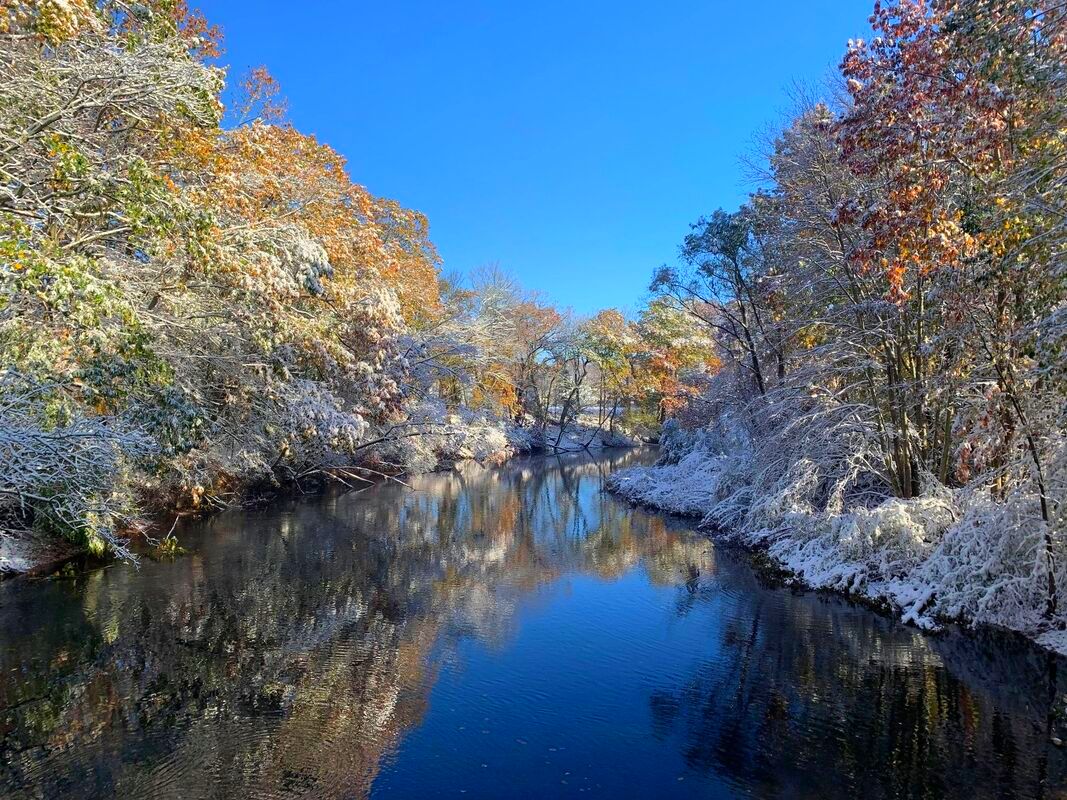 OK so...I have always been a religious person. Spirituality, theology, ethics, and philosophy were interests of mine since before I could remember. Honestly I think that as kids we are all intrigued by the question or our existence and purpose. Over time--and as we develop more accessible passions--those questions retreat to the backs of our minds and wake us up in the middle of the night occasionally. Am I living a just life? What is love? How do I act out of love? What will I do with this time before I die? These are hard questions to think about when we are trying to tag all the mundane bases of modern life. After all, asking these questions doesn't get us any more cash. If we take them seriously we sometimes get less! They also don't get the grocery list done or the house cleaned or the report filed. This means that most of us have little time to truly consider these questions and so being "spiritual" becomes associated with a vague warm feeling we experience on Christmas Eve or on top of a mountain. In those moments we are forced--in the face of awesome beauty--to at least acknowledge our connection to something greater. Then, holiday or vacation over, we return to the grind of the "real" world. Look, I love to hike. I love Christmas Eve! However, there is so much more to these questions and how we answer them. To think of our faith as something that exists in a discrete box--literal box in the case of a church building and metaphorical box in other cases--in our lives is to miss the point of the religious life. To live a life of faith is to consider these questions all the time. Then, through these questions, we touch the Transcendent. We experience the Divine and let it influence our next steps. Now clergy--like all people--go through rough spots in their faith and discipline. Our beliefs change and grow. We reject some ideas in favor of others and then sometimes return to the original belief. We also go on autopilot sometimes. The fact is, most of the work of a clergy person isn't terribly religious on the face of it. There are a lot of meetings and lots of planning for things. There are parties, classes, discussions and whatnot. Setting these events up isn't terribly theological. I have been through quite a few periods where I start to lose track of my faith and become basically like any other non-profit administrator. Then--usually--something will happen that reminds me that I am, in fact, a pastor. In those moments I recall that even the boring, mundane work of my day requires me to act out of big questions and their answers. I bring this up because when the pandemic started--along with some personal physical problems noted elsewhere in my blog--I was pretty sure that I would go into "survival mode" and that the journey of faith would take a back seat to everything that had to be done. There have been times where this was true. It is particularly difficult to stay faithful when there are thorny problems in need of resolution and a number of voices and differing opinions "speaking" at the same time. Occasionally I have struggled a bit while trying to seek consensus that hasn't really been there and trying to be rational for too long. However, in the end, I have found myself letting go and falling back into the answers those questions force upon me. I am learning to fall back on faith. It is weird to think of this as being something less-than-obvious in a congregation, but we all live in the practical "real" world. My faith community is filled with problem solvers who enjoy marshaling facts and applying them to sticky situations. Listening to hearts is harder. We are not rewarded for this behavior in our non-church lives. Our basic approach is to fight to get our way. We are surprised and frustrated when we don't. Right now though...things have changed. These days the path to survival and growth lies in thinking about others. It lies, in fact, in spirituality, ethics, theology, and philosophy. It is embedded in what we do in our religious lives. Social distancing--like social justice--is a practice of putting someone else's needs above our own both actually and symbolically. It means asking questions with no easy answer and putting our own egos aside for the sake of the group. This is a time where our faith needs to be strengthened. Which means it must be flexible. It must bend and not break. It means we must be intentional and conscious of all that is around us and move how the spirit directs. Anyway, I have had to make some tough decisions lately. Some of them are no doubt unpopular in certain quarters. Like everyone I know, I don't really have much of a clue what the future will hold for us. Yet I find joy in what I have discovered about my faith in this dark time. I was never sure it would withstand something like this. Instead it has grown. So a short celebration is in order, right? I hope that your faith is holding you up. If it is, congratulations! I congratulate you from my social distance. If it isn't then I am praying for you. All I can say is that I have been there and odds are I will be again. Keep up the good fight and let me know if you need anything. OK, essay over. I need to get back to work. There are more hard decisions today as there are most days. I will be thinking of you all. We will make it. We truly shall.
0 Comments
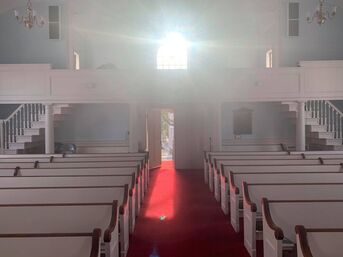 So we had our outdoor communion service yesterday. It was our third attempt at such an event and you know...I think we are getting the hang of it. I made it up to the church early--like I used to--in time to run through the brief words I was planning to say, It was All Saint's Day. The church, of course, was quiet. It always is at that hour. the fact that we still use parts of the sanctuary for storage reinforced the feeling a bit. Then the rest of the "crew" arrived. We set up with relative ease on the steps of the church. There was the communion table we always use, and the bread (for the first time individually wrapped communion wafers). Of course we also had the wine and the "wine". We always use the single-serving "little cups" for communion so--as long as we don't pass the plate and instead have folks step up to the table--they are naturally distanced. Everything was laid out on their respective trays the day before. They were maximally safe. the whole thing made for an odd combination of high and low church. Partly we were doing what we usually do. Partly we were a bit "off". However I would say we were comfortably off. Nothing felt alien. Finally, we decided on a "sound system". We had a microphone and a used practice amp that I bought a few years ago for $25. The goal was to reduce any yelling the officiants had to do. I yell when I am just chatting with someone. I yell even louder if I think people cannot hear me. Then people began to arrive. We waited the start time a bit so that folks having trouble getting settled could do so. Most people stood. We grabbed a chair for one person who has trouble standing. We grabbed a mask for one person who forgot theirs. Then we got rolling. The service may have been a bit casual for All Saints and it was definitely shorter--slightly under 25 minutes. However, it was the reason and the ritual for gathering. Truthfully we hung around for well over an hour in the end. It was good to see folks in 3D. This is the sort of thing I am willing to be a cheerleader for. As a church we are affiliated with the UUA and the UCC but really we are a community church and Congregationalist in its broadest definition. Worship isn't a discrete moment that happens in a specific place or at a specific time. It is what happens when we live our lives together as a community and a congregation. That is part of the tension, sometimes, when we think about how to respond to the pandemic. In another tradition--though I am actually having trouble thinking of any--perhaps there is a reason to elevate the "show" of worship over the communal needs of members. We are not a part of that tradition, though. We are part of one where we assess the needs of the people before putting folks at risk. the body and the spirit are connected after all. Yes, there are reasons why we might want to step--as a group--through those doors and into the sanctuary. There are issues of mental health, which I take very seriously. There are issues of church growth which I am not sure rise to the same level right now. I believe--and I know I have said it before--that God is Love. Sometimes we show our love for each other and for God by being together. Sometimes we show it by being apart. Sometimes we show it by standing on the church steps to take communion on a cold, snowy, November day. Part of our job--not just my job but all of our jobs--is to lead with that. We are opening our hearts during this dark time to the Divine and to our fellow, fragile, human beings. Back when I, my ministry, and Facebook were young, there used to be a big fight every year in the online "clergysphere" about whether it was ever appropriate to cancel worship during a snow storm. Many people--including many religious liberals who served churches that closed in July--insisted that church remain open saying, "God must be worshipped in God's sanctuary". What a tiny God that must be to live in our tiny buildings. I never found that argument to be terribly compelling.
God is not lonely. God doesn't need us to come visit. God is everywhere. Love is everywhere and we must adapt to what nature throws at us, knowing that the Divine presence is, in fact present wherever we may be in our storms and trials, Let us seek that Divine Love. We sure do need it now. Last night we had one of my favorite events. Every year on the night before Halloween the congregation and our neighbors surround our church with jack-o-lanterns and light them up during rush hour. We almost didn't do it this year--there was a snowstorm--and the general down-beat nature of the time was pushing against us. However, this is the holiday tradition that requires the fewest pandemic modifications. It is outdoors, after all, and we need to wear masks...on Halloween. Anyway, for the most part the event was great, but after a couple hours I was happy to get back home. I was frustrated--not by the jack-o-lanterns, or seeing my friends, or the excited cluster of kids--but from having to field complaints about why we are not having in-person, indoor, worship on Sunday mornings. As the pastor, I am part of the team that makes decisions around how to handle COVID and I am also the one who gets to hear from people who disagree. I get that but, man, it's not easy. Honestly, I do understand. I would rather be in church, too. I have built my whole life around what happens inside that building. The rest of the week when other people go about the rest of their lives...I am still there. The rituals of the church are a part of my identity. The church I serve and have served for over 17 years is part of my identity. I cannot stress this enough. I find it damned depressing to not be able to go in there and stand before the entire congregation to do what I do. But there is a problem. The plague doesn't care about any of that. When people complain about the church being closed I sometimes wonder if they know there is a pandemic on. Do they know how much the church leaders would like to be having church in person? In my heart I know they do. It isn't fair to them, but there yah go. We have also heard about the church that was open and everything worked out (so far) just peachy. Yet we also--because it is our job to research these things--know that that situation is unusual. The fact is, this disease can kill you. If it doesn't kill you, it can ruin your life. I think at this point we know enough folks who have had it. All those people who catch it but don't die? Many of them will be struggling with the results of this disease forever. It seems like quite a risk to take just to be in church. My theology doesn't sustain belief in a God that would demand that of human beings. God does not live in our sanctuaries. Another thing we forget is the fact that we are not as young and healthy as we think we are. I am a few months shy of 50 years old, myself and that does NOT make me immune. It is quite the opposite situation...and I am still considered young for my congregation. I see a few things at play here. First off, I am not sure most people respect nature nearly as much as they should. Here in the 'burbs we can go for a walk on the local rail trail and think we are in the wilderness. We are not. We think we can control nature and, therefore, the virus. We cannot do that either. I am tired of my northern relatives sending me articles of the increasing numbers of people being airlifted off the Presidents and Mount Katahdin. I am tired of the articles about the massive amount of litter left by my fellow suburbanites shedding weight when they realize that the mountain they are on is not like "hiking" at the local Audubon sanctuary. Given our inability to remember our masks when we leave the house (along with our unwillingness to turn around and go get them). I think I will be getting more of those articles. Second, we have learned so much about managing this virus. This is a good thing...but it is a double-edged sword. It feels to all of us like--given what we know--we should be able to do what we want. We have waited for a long, long time. It should be over by now. Problem is...it isn't over. In fact it is getting worse again. I know that I and others keep asking ourselves where the line is between a safe event and a spreader event. We, too, feel the "group-think" inclination to declare victory merely because we deserve victory. It is challenging to push back against that in our own lives. It is even harder to do so in community with people we love, who want to return, and who we want to keep safe. Just now I was talking to my wife, trying to figure out what we do for tomorrow's communion service. I am meeting with the Head Deacon later. There is snow on the ground. It will be cold. Is this the time that we head indoors? If so...how and why? As the weather gets worse I know that at some point we will need to format worship differently in order to be indoors (smaller groups, assigned seating, MASKS, et cetera). The problem is, each thing we know is true also opens up more questions. It is so tempting to ignore those questions and move straight to a certainty that oddly fits our convenience. I also think there has been a massive failure of leadership at the national and state level.. Everybody wants to be the cheerleader. We all want to say that we are "rounding the curve" or that--at the state level--the resurgence of numbers is just because of those darn kids and their parties. We are not rounding the curve and--sorry Governor--there doesn't seem to be enough evidence to blame the new numbers on the kids. The fact is, we don't know why we are still catching it other than that we aren't doing what we should in general be doing. Someone needs to make sure we don't backslide. However, big-time politicians like to be popular. We all do. Therefore the hard work of saying "no" has fallen to local leaders, local business people and, yes, local pastors. I have also, as a parent and citizen, had other people who are in a similar role say "no" to something I wanted to do. I know they don't want to say it. I also know that they have no choice. Sometimes, I have to remind myself that we are all in the same boat. Anyway, my most comfortable role in these situations is to be the cheerleader, too. I want there to be a coherent argument from the government about what is and is not safe, instead of personal theories that reinforce other people's personal theories. I want it so I can tell people that they are doing great and we will get through this! I want everyone to understand that we are facing great risks but that we have the spirit to persevere. However, since as a society we have decided everyone gets to do the cheering, I have to be among those who tell people to wear a mask. I am the one who gets to tell folks when and how we will worship indoors. I don't like it. But that is how it is. I am not a cheerleader today. There are a lot of smiley faces being slapped onto desperate situations. That optimism is generating a sense that we can negotiate with the plague and that if we want something very much we will get it. I am having to be honest with the church instead of super-perky. That is my job, too...as exhausting as it is. Pretending otherwise isn't going to help. You know what though? In my best moments I realize that God is on our side in this moment. As I said earlier, God does not live in the church, but among the people; inside us and between us. God is Love and love is where we must begin our response to life every single day. This is just as true as we move through this winter. In the end I am a pastor. All I can do is talk about faith and worship. Faith is something we possess that a loving church community can help us sustain. Worship is when we connect to the Divine, sometimes in transforming ways. Neither of these require a specific building or sanctuary. So what I do--what all my clergy colleagues do--is find ways for ourselves to worship and for others to worship as well. We are wandering in the wilderness. This isn't the wilderness at Baxter State Park but instead the wilderness of our society and our souls in transition. God is in this wilderness with us and while we would like to find Her in the old familiar ways, right now we must journey on and discover new--hopefully mostly temporary--ways to gain that connection. Here is a video that I sent to the church this morning. It is typical of the sorts of things I have to say in person, too. Be safe out there and be kind to each other. 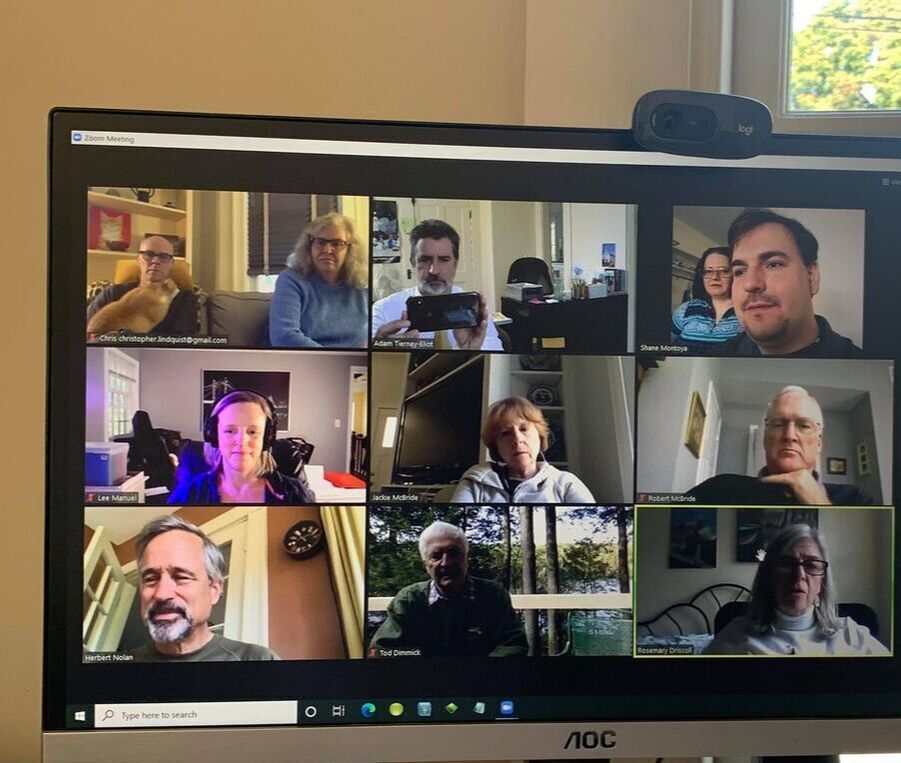 I had the surreal experience of getting ready for church almost like I used to. It was yesterday--a Sunday morning--and we had planned a outdoor communion service for folks in order to slowly ease our way back to in-person worship. As any church person will tell you, regular Sunday morning church is still a long way off. Here in the United States we persist in the idea that we can will the virus away, or negotiate with it and then--when it sees our resolve and our good intent--it will ultimately leave us alone. Of course, that isn't how it works. So for now even a masked, socially distanced, outdoor event is concerning. Anyway, what we decided to do was have this small service at 9 AM, just an hour before our pre-recorded YouTube service. That meant that I had to get up and go through the Sunday morning rituals of 2019 to prepare. By "rituals" I don't mean anything religious. I mean getting showered, shaved, and dressed. I mean gathering my service materials in one place and then, around 7-ish, heading to the church to start getting things ready there. I did this every Sunday for years, not really waking up until I was well on my way. Yesterday, though, I found it hard to get my act together. It turns out that getting ready for church is not at all like riding a bike. I felt clumsy. I had to find my dress shirts. I had to match my pants to the rest of my outfit. I know that pants jokes are pretty tired right now...but it was true! When we are in worship out in the "real world" the participants bring their whole bodies to the occasion. Suddenly had to think again about how that body should be presented. Anyway, I managed to get out the door and over to church. We (thanks deacons!) managed to get our communion table out on to the lawn, set up the elements (arranged the night before to limit human contact on the day), and place a station near the "entrance" for spare masks and hand sanitizer. We decided against amplification expecting--rightly--a small turnout and only slight car noise on an early Sunday morning. Then we had our service. Ultimately there were nine of us. Given the size of the church that is not unexpected or unusual. Also, some of our members don't take communion for various reasons. One member arrived late and some of us took it again so he didn't have to go through the ritual alone. Then we hung out a bit and waited until 10. At that hour we rang the church bell. One of our denominations (United Church of Christ) asked its churches to ring their bells 20 times at 10 am every day for 10 days. In the symbolic math we are using this is meant to represent and mourn the 200,000 COVID deaths in this country. We are almost done. The last day is Tuesday. The reason for ringing he bell has been a heavy subject, of course, but there is joy in pulling the rope and hearing the sound of the bells again. After the bells the "live", even "normal" church was over. Everyone went home except for me. Instead, I turned on the church computer and watched/moderated the YouTube worship, taking communion again with essentially the same service lead--again--by me...but recorded on Wednesday. I have to say, the act of being both in front of the congregation and in it is something I can't quite get used used to. Like the bending of the church week, my sense of perspective and place has been challenged as well. YouTube lead to Zoom Coffee Hour, where a few of us stayed on and talked for a good long time. Then...it was back to in-person for a small picnic (bring your own food) at a nearby park. Again, it was good to be with the gathered church. Even though we could not sit a close as we used to or share food, at least the conversation could be more organic than the one we had online. Once again, we brought our whole bodies and it was good. So that was my church day. I was exhausted by the end, but happy. I had seen people, we had talked. I had taken communion three whole times! However, the experience underscored the liminal nature of this time. It made me think a bit about the challenges and blessing of travelling though our current uncertainty. So, narrative of my day over, I have some random thoughts to share as well... 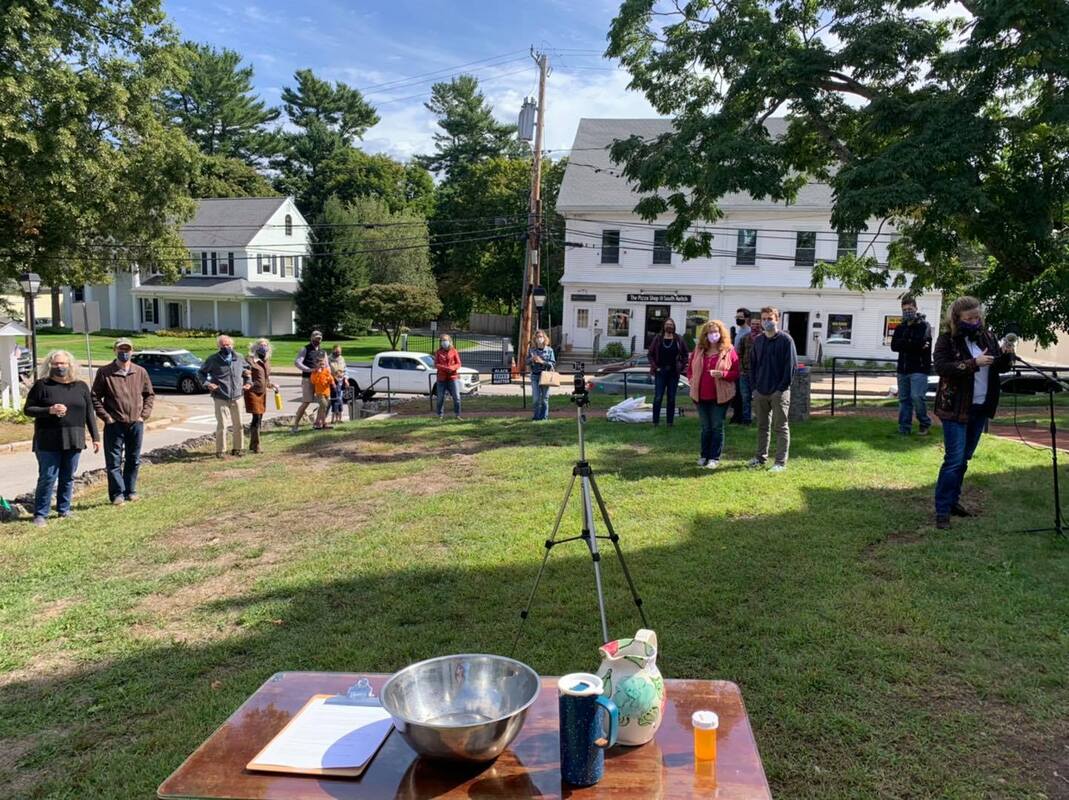 These are numbered but NOT in any particular order... 1) Attendance is lower this year than in the spring. By "attendance" I mean in-person and virtual. I have a rough idea of how many church members watch and that seems to be steady. We can count folks at our in-person services and events (we have had a few now). What is happening is that online, folks who don't usually go to church are ceasing to watch the videos. Also, people looking for a church are frequently putting their plans on hold. This isn't entirely a bad thing. In person...well...do we really want a large turnout or just a good one? We don't want people to get sick. I also wonder if there are other concerns as well. We are stressed out, many of us. There seems to be--as we start our fall--quite a bit of free-floating anxiety looking for a place to land. I am worried that people are finding it hard to concentrate--I am--and I wonder how that impacts not just congregations, but the world at large. We are experiencing a number of depressions--not just economically--as a group. How do we survive? How do we help others? I don't know but I am thinking about it. What I do know is that we will need to get used to this lower turnout. We will also need to get used to a net increase in small events. Tiny worship, picnics, "Yard Theology" these are important--even necessary--ministries but they require a lot of effort and intention at times. We need to remember how important and necessary they actually are. We must remind ourselves that the effort is worth it. 2) One important topic of conversation yesterday, at all three events, centered around the deaths of two beloved members of our church. I knew Augie and Jim very well. Most of us did, so we are in mourning. It was good to talk about them yesterday. That said, our conversations were informal. When and how do we formally mark their passing? Normally I would be planning memorial services and we would go through the institution of public sharing and grief. That process has been interrupted. We have some thoughts about what to do but nothing that is deeply satisfying. 3) Perhaps obviously, I found it a challenge to shift gears from event to event. This is new. Back in the day I could stack up church stuff from 9 to 9 on a Sunday or a Saturday and move through the stages, often seeing the same people in different contexts throughout the day. I would be physically tired at the end but not mentally or spiritually tired. In fact it was quite the opposite What was different about yesterday was going from in-person to virtual and back to in-person. It was strange having two services with one so "virtual" and one so not. Only one other person did all three events. I will ask her how she felt about it. I know she will tell me what she thinks. After all, we are married. 4) The logistics of this time are strange. I prepped two services this week and attended both on Sunday. We are planning more "tiny worship" services. Some of those will not be centered around communion. We need to do this for the mental health of many of us and, of course, for the future of the church. That said, it is a time-consuming process that brings the strangeness I mentioned earlier. Time and space are bent like a slow-moving (and somewhat less exciting) DR WHO episode. It is a challenge for our leaders. 5) As a religious professional all I can say is that the j0b is changing and as we come out of the chaos some parts feel deeply old-fashioned. I mean, when I went through seminary they were all about the pin-striped executive model of the 1980's combined with a professionalization of the "care" portion of the job. It was about being an organizer, an expert, and a boss. We were meant to be professionals in the mode of many other professions. Now we are blasting back to the 19th Century where the cleric is responsible for multiple coherent worship services, expected to keep up on--and speak out about--social issues, and to study. Ministers find themselves being artists, intellectuals and--dare I say--religious leaders in a way that was out of fashion for a time (at least in the church circles I have moved through). We have always been these things--clergy are generalists--but now our spiritual and religious center is what people want or need, rather than the tasks and skills we are trained up in and use to get through our day. 6) I have no idea what the future of the church will look like. This is true of the "big C" church and also of the one I serve. So much is in flux. Each individual is making a series of micro-decisions that affects how they will interact with their faith in the future. Each person is making similar decisions about how they will interact with the institutions in their lives. When the faith and institutional questions intersect, the old 20th Century will feel it. Whatever the change is, it will start local. Every context is different. That is all for now. Yesterday was an education, obviously, but this is a new day. Informed by the past we look toward the future. I wonder what it will hold... Here is the part of yesterday I can share. We made the choice not to record in-person, but the internet worship is eternal. It was World Communion Sunday. 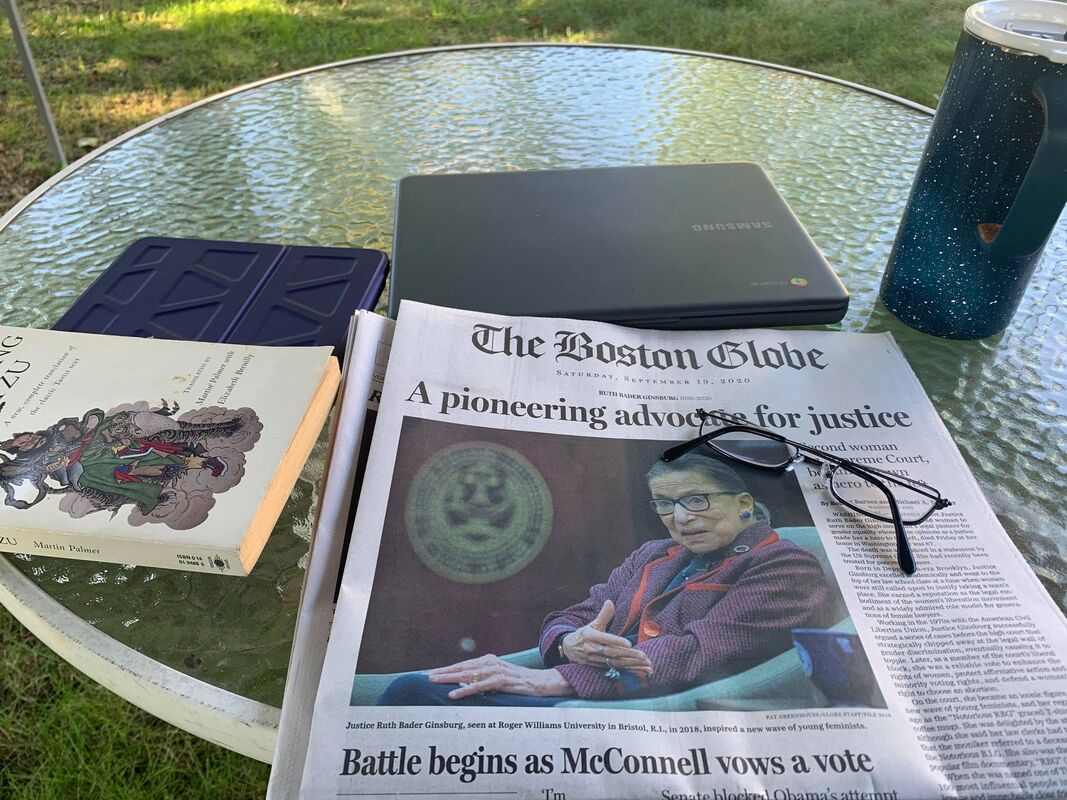 I woke up early this morning because my back was killing me. The final frontier of my recovery seems to be that every day I get about an hour less sleep than I need. It is quite the time for it. Every day is already surreal so a little sleep deprivation gives me an excuse for moments when I am at a loss for words or for when brief waves of anger, frustration or grief come over me. I am just a bit sleep deprived...yeah...that's it. Now I am outside beginning the process of sermon writing. I am not writing tomorrow's sermon of course. That was recorded on Thursday. Nope. Time has bent so much now that the weeks overlap. Each part of life has its own sort of week and each one of them appears to be nine or five days long. It is hard to do good work in this situation. We all know this no matter what "work" might be whether it is paid or unpaid activity...or just getting up in the morning. Next Sunday is our "Ingathering" service. We put it off a week to get ready as there are a number of moving parts, not the least of which is our "Water Gathering." That is when we bring water from a place that has been important to us over the past year and collect it in a bowl for the purpose of Baptisms, Child Dedications, and other blessings where water would be helpful. In some strictly Unitarian Universalist churches they call it "Water Communion". Since we are also a member congregation of the United Church of Christ we do not. We celebrate actual bread-and-wine communion the first Sunday of every month and water communion definitely isn't that. Anyway, it will be a bit crazy with "live" parts occurring beforehand to be taped for the actual Ingathering Sunday on the 27th. More time bending...No worries. But right now I am thinking about the theme for that Sunday. I am thinking about water, its powers, its flexibility, and its vastness. I am thinking about the rough currents of this time. "Fortune is a river," says Machiavelli, and many of us feel the uprooting force of fortune in flood. Frankly one would have to be pretty darn insulated to see and hear the news of the past few weeks and be able to deal with it on a purely intellectual level. The problem for the preacher these days is how to address the many current crises of our time while also connecting to the Divine. The challenges of this world drag us into the muck where we fight. That fighting is good and necessary! This is no time to be polite in the face of state-sanctioned violence, government neglect, and environmental catastrophe. There is no excuse to hide for long in the face of the bending of time. However, the power that we draw from to keep from getting consumed comes from our faith and we need a strong faith now. You see, I firmly believe that the blessing of a faith that challenges us is that it prepares us for the challenges we face. I also believe--given the world we live in--that our faith will not be able to sustain itself on its own. The spiritual path needs tending. Those of us who tend it regularly--at least our own if not the faith of others--are struggling. What about the people who got busy and haven't checked in with The Ultimate lately? What about the ones who are discovering that relying on cute quotes from Facebook memes isn't the way to keep keep one's eyes on the prize when the sky is on fire? Anyway, preachers, I see you this morning. Church leaders of all stripes, I see you too. I feel like I am not doing my best work in a time when my best work is necessary and I know that some of you feel that way as well, no matter why you couldn't sleep this morning. Here is the thing, though, we, at least, need to rely on that relationship we have cultivated in better times. Even now--especially now!--we must let go a bit of our own responsibility, our own reliance on competencies, and fall back into God. We need to pray (or meditate or study or whatever your particular discipline is) we need to pause. We need to understand that when we work at our best we are reaching into the hidden world to build a better world that is not concealed. If you take care of your hearts and souls, I will take care of mine, but we need to do this together and with others. Then we can reach out to care for this hurting world. It will require humility. It will require that we look beyond ourselves, not just to God but to other human beings and to nature. Self-reliance is killing us. So is the cult of individualism. Tomorrow's sermon (already recorded and in the can) is about our struggles with new rules; with trying to do the right thing in this world. I think on Ingathering Sunday I will lean into the vastness of Creation and the power of Divine Love once again. We need to remember its presence when there are forces in this world interested in stripping it from us. We need to manifest it, too, even though the reaction is...less than ideal. It takes faith. It takes courage. It takes hope for the world. Yesterday, while we were all discovering that Justice Ginsberg had died, my son and I were testing out the new "portable fire pit" at the parsonage to prepare for the Yard Theology session that will occur on our driveway later today. It is cold--52 Fahrenheit where I am sitting right now--but we need to see people. We need to talk. We need to remember our shared humanity during this time. Wherever and however you are today, I hope you find it. Let me know if I can help. We can do this. I do believe it. Today I pray That the new week will be better than the next That hope will come out of this darkness That we see our connection to each other To Creation To the Divine And I pray For the strength and wisdom To travel through the rough land To the better land beyond 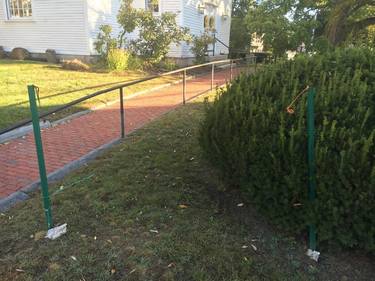 If you happened to walk or drive by the Eliot Church in the last few days, you probably noticed that something is missing. On Saturday night (as best we can tell) someone tore our Rainbow "Peace" flag out of its usual spot and walked off with it. In the morning, I noticed its absence as I headed in to work, Of course we went through a brief "denial" phase. We don't like to think of our neighborhood as a place where things like this happen. However, it appears that it has. The grommets were still in their place so it wasn't one of us moving it for some reason. Members even walked around the neighborhood to see if the wind blew it away. This theory already seemed unlikely, as we had recently switched out an older, more fragile flag for this one. It was in pretty good shape. Needless to say, we didn't find it. Eventually we contacted the police and they did the same things. The officer we spoke to, came to the same conclusion we did. Yes, it was most likely stolen. We don't know who did this, of course, and hesitate to ascribe a detailed motive. That said, we assume that they didn't take it to put in their room or to otherwise display for themselves. If that was the case they could have just asked for one. We have plenty for that purpose. So, what did we do when we met for worship at our appointed time? It was World Communion Sunday, a service dedicated to what holds people together in the midst of disagreement. It is a day when Christians around the globe take communion together. The issues represented by that flag, of course, are ones that divide many people both Christian and non-Christian. It seemed fitting to mark this occasion the way we had planned. .We took communion, too. We chose to stand for unity and for building relationships across ideological lines. Of course we also prayed. We prayed for whoever took the flag. We prayed for those in our congregation who were impacted by the theft. Finally we prayed the entire LGBTQIA+ community, who have to endure much more than a simple act of vandalism. In fact, they do so on a daily basis. What are we doing now? We are putting up a new flag. Like I said, we have plenty. We will even give you one if you want. We like to see them put to use. That flag is part of our identity, like communion, the cross in the sanctuary, or the many good works we perform in the community.. It stands for peace, obviously. It also stands for diversity. It is one of the ways our congregation offers support and welcome to all people. It is not healthy to hide who you are. We are an Open and Affirming congregation. We will not hide. This is us. Dear Members and Friends, Worship and Religious Education are well underway this year. I have been enjoying getting to touch base with you all as we have gone about our usual opening rituals. I enjoyed getting to see folks at the Kickoff Sunday brunch. I was moved by the sharing at our the Gathering of the Waters during our ingathering. This congregation is a community that supports and hears each other. It is wonderful to be getting back together after our summer journeys. It was also great to see so many of you make an effort to get to church! This brings me to another topic that I would like to touch on briefly. I want to talk to you about attendance. Keep reading! You can do it! It may even be helpful to know that our current attendance is slightly higher this year... We have always been a church with a much larger membership than we see regularly on Sundays. This is fine. In fact, even though this is the case, most people do manage to drop in from time to time. People work hard to make it to non-worship events when they come up on the calendar. Which is to say that we attend Pub Theology, Dungeons & Dragons, philosophy discussions (like our Emerson group), Chili Cookoffs, house parties, vigils, rallies, and workdays, among other things. We are there for each other outside of church and for casual gathers, too. Eliot Church is blessed by a dedicated membership. It’s just that we can get really, really busy. The world isn’t constructed around “sacred time”. Many of our members work on Sundays. Others have rigorous travel schedules. There are illnesses, child commitments, weather challenges, and social obligations that get in the way of making it every week. I get it. There are weeks I don’t make it to church either. However, I would like to encourage all of us to make a point of attending worship when we can this year. In fact, I would like you to consider committing to making it to church more than you did last year! I will, too. I can think of an infinite number of reasons why we should make an effort. I bet you can think of a few as well. However, I would like to mention three key reasons for this church this year. Our Faith Community Needs Our Presence To Thrive: You may have noticed over the years that Eliot Church has gone through some changes. We are very much a community in transition. Our RE program is divided between teens and toddlers with no one in between. Our outreach and justice work (and, therefore our profile in the community) has increased substantially. We have also grown closer together as individuals. Heck, we even go skiing in New Hampshire together! The fact is, this church is doing a lot of work and having a lot of fun. We need your presence to make the party better. We need your participation to make the load lighter. We need your ideas to maintain this congregation and guarantee its future. Right now the church is strong. We want to keep it that way. This won’t just happen on it’s own. I am serious. There are no guarantees. If you value the Eliot Church, it isn’t enough to love it from afar. We need you to be here with us to keep it a living, loving, vibrant place. Worship is the biggest part of that. It is central to everything else we do. Our Faith Community Needs Our Presence for Others: Guess what? Loving Eliot Church from afar doesn’t help when we have visitors, either. Worship is usually where they encounter the congregation for the first time. The past couple of weeks we have had a few newbies drop by. If you are not here, they don’t know that you are part of what is happening. They only see those who showed up that day. Yeah, we do our best when people cannot make it. That said, when new folks come to church they are looking for others on the same spot in their life-path. It’s not that they don’t want to hang with everyone else. They just want to know that people like them are welcome and supported! That means they want to see parents of young children, new empty nesters, retirees, young couples and old couples and be greeted by those people. Life can be lonely. Visitors want to see folks who are interested in the same things they are interested in. In a small church--and being a small church is also our strength--the challenge is that when one or two individuals or families cannot make it on a Sunday, it is like that entire group just doesn’t exist. Once again, part of belonging is showing up. If visitors do not make some sort of connection with people they identify with after a couple of weeks? They find somewhere else to go to church. The congregation misses out on potential members. We members miss out on potential friends. Those visitors miss out on a community that they may have loved and would have loved them. We Need Our Faith Community: Look, getting through the week is hard. It is isolating. There are times when all we do is move from task to task. Even things we enjoy take time and effort. They leave us feeling tired and wiped out. Maybe there are moments when we just want to “sleep in” on Sunday. This certainly happens to me. However, when we step back and really consider it, that doesn’t make much sense. Let’s set aside the fact that services are at 10am. When we are home most of us can realistically both sleep in and get to church on time. I get up between 5 and 6 most mornings. I bet a lot of the rest of the congregation does too. We get the kids off to school and then get to work by 8 or 9. The only “school” the kids have on Sunday is at church. Also, the commute to Eliot is usually pretty easy. It is near where we live. Traffic is light. What we are really suffering from is inertia. We forget that church has something to offer. We forget that it is only an hour long on the slowest day of the week. We are forgetting that we need to feed our spirits. We need the church but we worry too much about the demands of our everyday lives and neglect the sacred elements that give those lives meaning. This is what keeps us home. The fact is, what sustains us is exactly what the church is offering. Stressed out and tired? Come sit with us and take a while to put those worries in perspective. Find some solace and new life in the rituals and ancient wisdom that worship provides. Do you feel isolated? Guess what! Your friends are at church. We can talk to you about your problems. We can listen to you talk. We can just have some coffee. We are not the first people to feel the way we do. That is why we are meant to join in community to explore the Divine. Coming together in worship helps us to live lives of greater meaning and strength. 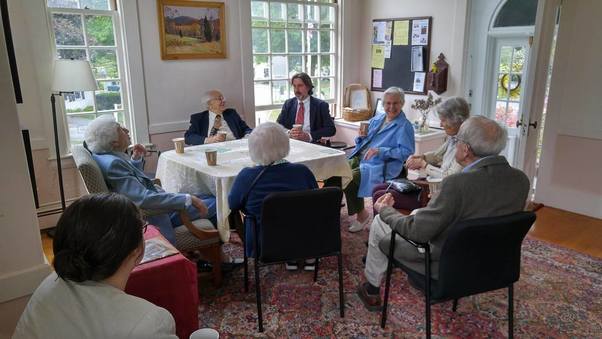 Final Note: As I mentioned at the beginning of this long screed, people are, in fact, coming to church. Also, those of you who were around a couple of weeks ago know that I made a big thing in the sermon about how worship attendance and participation is non-coercive in our tradition. That is true. Neither I nor the leadership is interested in making anyone do anything they don't want to do. That said, part of my job is to observe and encourage. Both your own spiritual well being and the future well-being of this community are in your hands. In this new church year, it is my hope that we continue to grow together as a healthy community of faith This Sunday we will gather in worship. We will have coffee hour. We will practice what we preach about being a caring spiritual community. I hope you can make it. If you cannot, then I hope to see you when you are able! See You in Church, Adam When I was a kid, this machine shed was a big part of my life. I painted it (twice). I helped reshingle it after the world's largest raccoon tore racoon-sized holes in the roof. I learned to sharpen various dangerous farming implements in its back room. I learned to "grease" vintage hay rakes that I would then pull behind a 1948 Ford tractor when I was learning to drive. Perhaps most importantly, it was the base of operations for my grandfather's Christmas tree farm and--therefore--one of the most formative elements in my understanding of how to celebrate the holidays. You see, even then Christmas and Advent were part of my job. I would spend my summers up on the side of those hills as a teen swinging a machete along the edge of a young tree in long, diagonal, downward strokes. I would try (and fail) to avoid the poison ivy, sunstroke, and angry critters who lived at the base in the underbrush. I did manage to not cut myself, which was an achievement considering how much I enjoyed sharpening things. Planting was the worst. It was heavy, boring work and there was no way to pretend you were fighting trolls. Thankfully my little brother, Dan, started to come down with me after a couple years. Then I had a friend and ally in my misery. At some point we would head back to school and family in Maine. Other relatives (cousins mostly) would help Grampa look after the trees along with the rest of the farm until we could come back around Thanksgiving. Thanksgiving meant tagging and counting the trees, mowing one last time between them, and decorating the machine shed to attract families from Poughkeepsie and New York looking for "authenticity" in their holiday rituals. It also meant dragging the immensely heavy antique sleigh onto the porch of the house. Everyone helped with that. The day after Thanksgiving we would cut one of the largest trees and put it in the front hall of my grandparents' house. The day after that we would cut one for ourselves. Usually it was slightly ungainly and unlikely to sell otherwise. Then we would tie it on (or put it in) the car to drive six hours north to our home. Yes, it was a bit "coals to Newcastle" to bring a tree from Dutchess County, New York to Maine. but we weren't the only ones! It was part of our family tradition. It was something from the ancestral home. Eight generations of our family had lived and farmed there. It was something that made my mother happy, a part of her childhood that we would keep in the house for a couple months until it was just too dangerous to comprehend. I don't do any of that now. When I became an adult and lived in places like Chicago and Detroit we had a plastic tree. When I served churches in northern Maine we went back to sawing one down at a place where you left a $20 bill in a can by the road. However, when we finally moved to the 'burbs I had a sudden realization. I am still deathly allergic to poison ivy. We persisted cutting our own for a while but after a year or two of me preaching my Advent sermons like a goblin on Benadryl we resigned ourselves to picking one up at the local "mom and pop". They are nice folks. I also get my turkey and pumpkins from them. Still, I do think about what it was like back in the day.
Life moves on and the rituals of the season remind us of that. Climbing into the attic to fish out the lights and the decorations is easy in the years when memories are mostly good or if bad ones feel distant and the future seems bright. Other times it is a rough go. Either way, we hold on to the acts that make this time special. Putting a tree in your house can be a simple thing that you do because you always have. It can also be an act of resistance. It is a strange activity when you really think about it. This is why we often wait until the time feels right. It took a while for us to get one this year. Years ago as a blade-wielding teenager in the hot sun I wondered who would end up with the tree I was preparing. What place would it hold in the celebration? What sort of family would it witness? It always seemed worthwhile to give it the attention it deserved both then and now. Be mindful, whether you are handling tools or hanging lights. I have been both busy and mindful lately, just not with trees. I have been fortunate that my present includes the promise of Christmas Eve services and Advent candles. There is still holiday stuff for me to do. It is still part of my job. These days that job is quite a bit less isolated than raising trees can be. Besides, there are other rituals that help bring meaning and underline the specialness of the season. This year the idea of a small, hot flame in the cold dark has been more compelling than the festive pine with its promise of Christmas morn. Back on the first Sunday in Advent we held a rally against racism on the town common. After the recent election there has been a rash of racist activity in the area that needed to be addressed by our community. Our interfaith clergy association was among the groups that stepped up. We lit candles. We stood in a group. We held our lights near each other to push back the dark. I said a quick prayer at the mic that I do not remember and as I stood, listening to various colleagues say (and pray) their piece, I felt a different sort of spirit. I was reminded that even as we walk through hard times in our lives we are not alone. There are friends and strangers to hold us up. There are people for us to lift up, too. I value them and am grateful for them all. It was another chance for mindfulness. Anyway, we got the tree up this evening. We bought it at supper time so it sits in its stand undecorated for now. Tomorrow the house will smell like coffee and evergreen. Eventually we will put up those lights. Then we will go up to attic. After that we will continue to live in hope and love for another season. 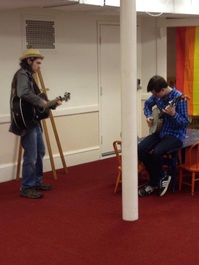 This Friday is the big Coffeehouse. We have two a year. This one--youth only--has always been the largest in terms of both participants and audience. There is an art show attached to it as well. The visual artists display their works and we keep them up for Reformation Sunday, which is also a big day in our church that includes worship, a "pageant" (about Olympia Brown), D&D, pumpkin carving, and the Jack-O-Lantern competition. Anyway, Friday is an important day for some of the kids and they work pretty hard to get the weekend going properly. It has always been interesting to watch the youth prepare. As young artists they are learning a variety of "languages" they can use to express their inner thoughts and feelings. It is a challenge for them. We all want to be understood. We also all know that our audience--our "public"-- will fall short of fully comprehending our message. Still, we try to get it right, don't we? To be fully human we have to try. A song--a painting, a poem, a photograph--comes from deep inside us. As artists our hopes are high. However, it helps to keep our expectations more realistic without also crushing that dream we wanted to share in the first place. I know how the kids feel. I have struggled to be understood in a variety of media over the years. However, the one I care about the most is preaching. I will never be a great (or even good) musician. My photography doesn't get much past the "pretty picture" phase. In pottery class I once made a 4-foot tall unbalanced black vase which may have been the ugliest thing ever offered up at a school art exhibit. I admit that I abandoned it. I walked away. For all I know it still sits there by the door to the North Yarmouth Academy teacher's lounge collecting cigarettes and dust. Preaching, though, I care about doing well. I feel it when I don't quite hit the mark. Yeah, preaching is an art. At least it is sometimes. It falls into the same category as chairs and benches. They can be built just to keep your bottom off the ground or they can be built to also elicit a feeling or a thought. I bet they--chairs--can even inspire action. I can go to the Museum of Fine Art to see (and sometimes sit on) a wide variety of items, or I can sit at my computer to get my emails done. One chair is not better than the other. They just have different purposes. One is a practical item that helps support our daily living. Our bodies and our backs are grateful for its presence. Another is all of that plus art. It makes us look up, out, down, or in. Even though we may be physically stationary we are, in fact, moved. Sermons should fall into that second category, even when people do not notice the "soul" within it. I have plenty of friends and acquaintances who work in professions where talking is part of the job. Politicians and lecturers (the good ones anyway) often use some of the techniques of preaching to improve their own work. Others believe there is no difference between a good lecture and a good sermon. Those folks are wrong, of course. You can give a fine presentation, but performing it in church doesn't necessarily mean you have come close to touching the sacred. After all, I can make a witty, informative, entertaining, motivational talk using the tools I am teaching those teens in my public speaking class. However, I still fail to preach sometimes. I have done it before (sadly) and I will do it again. The fact is, to create art one must dig deep. A good sermon--just like any of the offerings at our coffeehouses--requires a bit of personal exploration. It requires a moment of connection to the great "out there". In the moment of creation and interpretation we find that part of us and/or our world where normal conversation fails. Then we try once again to articulate it. As the Apostle Paul says in his letter to the Corinthians, "If I speak in the tongues of mortals and of angels and have not love, I am but a noisy gong or a clanging symbol." Finding that love (here used in its broad, theological sense) is the task of any artist--and we are all artists. The preacher tries to find some small glimmer of it each week to issue an invitation and offer up a path for people who hopefully feel drawn enough to walk another mile along the way. Preaching, like any art, requires discipline. We grow into our voices and into our "vision". Whenever you hear a sermon, you are listening to the product of hours, days, and years of prayer, meditation, and study focused into a tiny window of mere minutes. Sometimes it stinks. Sometimes it just isn't your bag. That said, have faith at least that the preacher is working hard. The colleagues I have met who didn't accept the preaching moment as a sacred one are all doing something else with their lives now. Leading worship isn't something you do without love. When I think of the kids getting ready for this weekend, I think of this process. I hope and pray that in their important and necessary playing around they find what they need to build a life of deep spiritual expression. I hope they find something that motivates them and makes all the steep lonely hours of practice and study worthwhile. The world of hard matter may never give them a measurable reward for their efforts, but maybe they will find that reward where they keep their souls and spirits. Maybe they will reach others through the foggy chaos of their existence.
Then--maybe--they will make us all a little less broken. 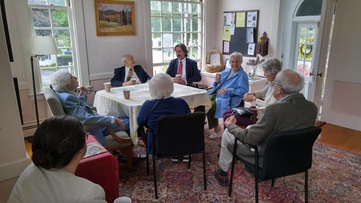 There is an article floating around my Facebook page that suggests the near death of spirituality in the protestant churches of the United States. In one way it is just another clergy clickbait article. It has one of those titles, after all; "5 Reasons Spirituality is No Longer Important to the American Church!" Also, it comes from a long line of "this is why we are shrinking" complaints and it--although the author points out that we haven't ever really be that good at spirituality in the first place--at least implies a fix . In these ways it fits just the sort of church-story I warn people about. However, it does underline a problem and it is a serious one. Here is an example; my dad, who isn't a church person at all, told me the other day that he had noticed that a certain type of institution was "picking up the slack" from declining churches. Guess what they were. Were they new age bookstores? Retreat centers? Martial Arts and yoga? Nope. He said they were libraries. Libraries!? What could he mean by that? The problem is we know exactly what he means. Libraries are another place--just like churches--that provide non-religious and non-spiritual services. They are a good gathering spot to talk about issues and to get to know people. I have a great one a block from my house. I love it. Dad's implication, of course, was that what libraries do is also what churches do. That is, not spiritual services, but community services. It is hard to view something as a spiritual place or a house of worship if you aren't interested in what those terms might imply. Secular society frequently sees a community center where some of the people engage in magical thinking. To a large extent, this is exactly how we sell ourselves to the world. That is the problem. Folks inside and outside the church see the congregation in pragmatic terms. It does what libraries do. Or what the salad bar did for single people in the '90's. Where can I meet people? What is the best way for me to impact and improve my community? Where can the kids get that little bit of enrichment--often with very little home reinforcement--that comes from Sunday school? I could go on. We see church as an avenue for good works. What we frequently miss is the spiritual grounding that is supposed to go into those works. Isn't spirituality supposed to be what the church does best? In my previous post we learned that for Frederick Henry Hedge the "north pole" of the church represents mystical connection to the Divine. The south is for rituals to help us get there. The west draws us to adventure and exploration of ourselves and of the great and wondrous world. The east grounds us in our core beliefs. Many people work hard to situate themselves and their communities on this compass but we are so distracted by the practical bits--rental agreements, the big fundraiser, the fall fair or the new initiative--that we can lose track of why we are doing these things. Church isn't just a place to be busy or to be in some sense a good citizen. We do these things through a congregation because we are spiritual beings trying to live lives that are in some sense religious. Sometimes I wonder if all our activity actually is part of the problem. Most of the ministers I know work hard to develop their own spiritual paths. Some of them are involved in rituals and pilgrimages. Others are more likely to study or discuss. Virtually all of them try to pray and meditate. They offer these options at their church from time to time. They try to provide explicitly spiritual opportunities for children and adults. Rarely do these programs become popular. There is a small core in each congregation who has the interest and can make the time. There are others who would like to participate as well. Yet we instinctively know what will bring the most people out and the emphasis goes there. When we do this we risk becoming a library without books. Which is to say a library you might visit but are unlikely to join. I do wonder what the new church will do to lift up this central element of church life. The challenges are many. People cannot (or will not) make it to worship on Sunday morning in the numbers they used to. Other times all seem problematic. Clergy are expected to be a resource on these topics (and are) but few people ever ask them a question. Some people feel that there is so much "important" stuff to think about (like the acquisition and maintenance of money and stuff) which leaves little time to consider the reason we exist, and what makes a just and holy life. The new church will need to find a way to reach out to those folks. Also, the church needs to figure out a way to cast a line to those people who try to be part of the spiritual life and cannot do it on their own. These are the people who grace our pews when they can. They may think they are there for the coffee and the committee meeting but they aren't. They chose the church (or synagogue or mosque) over the library (or rotary or diner). There is a hunger that may not be fully understood and articulated in each of them. How does the new church find that hunger? And how do we feed it? Here are some links... First, to the article I mentioned: 5 Reasons... Next, here is a link to my local library. Frankly public libraries are struggling, too. In fact, most places where people gather together for free are having a hard time. Patronize them, and drop some money in the plate. They do good work. Here are links for other articles in this series The first one is a "Prequel" Here is Chapter 1 Here is Chapter 2 Here is Chapter 3 |
Adam Tierney-EliotThis is my old weblog of many years. I will probably post here from time to time is there is a subject that does not fit WWG. However WWG is the more active page at this point. Archives
April 2022
Categories
All
|
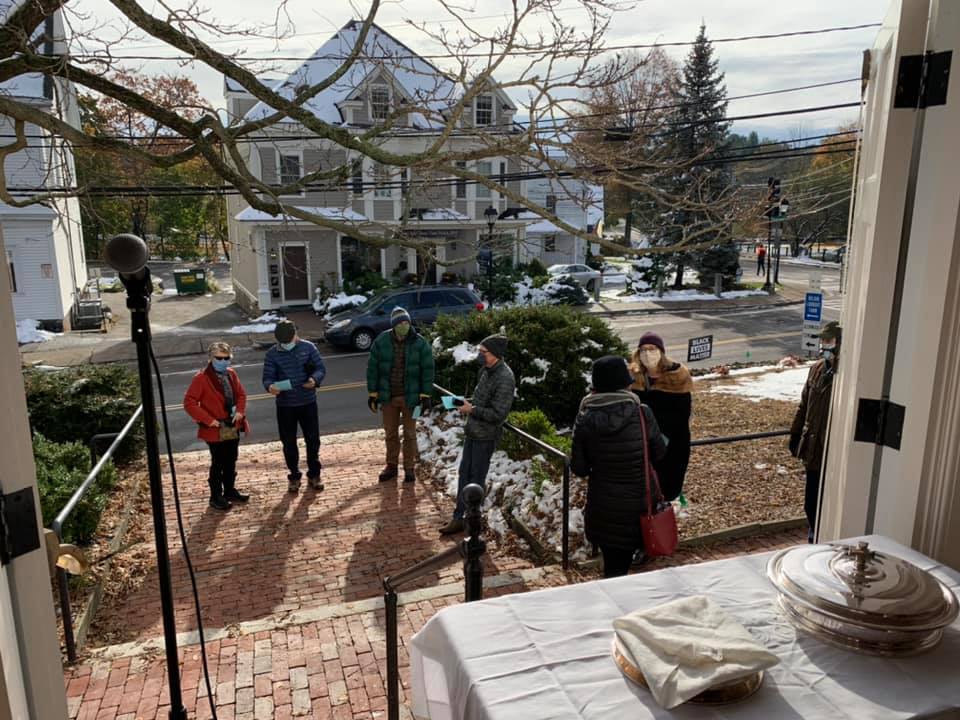
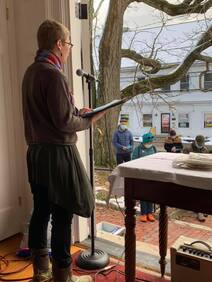
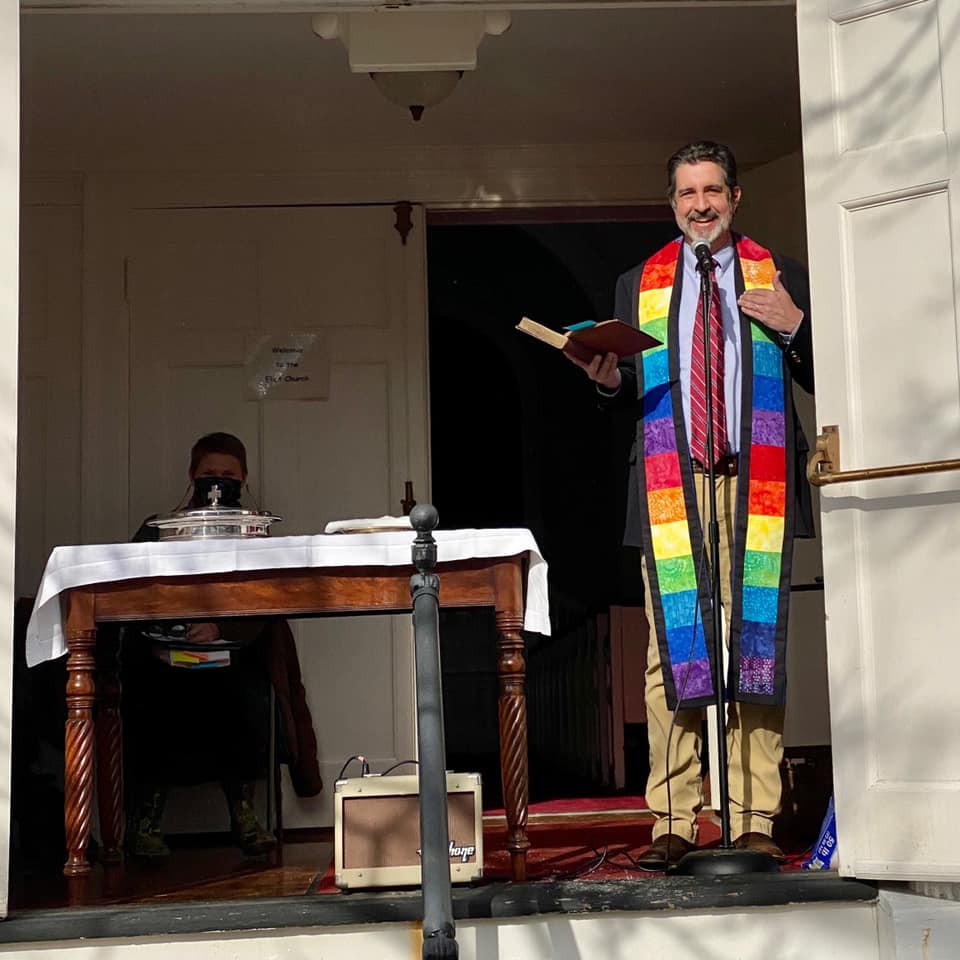
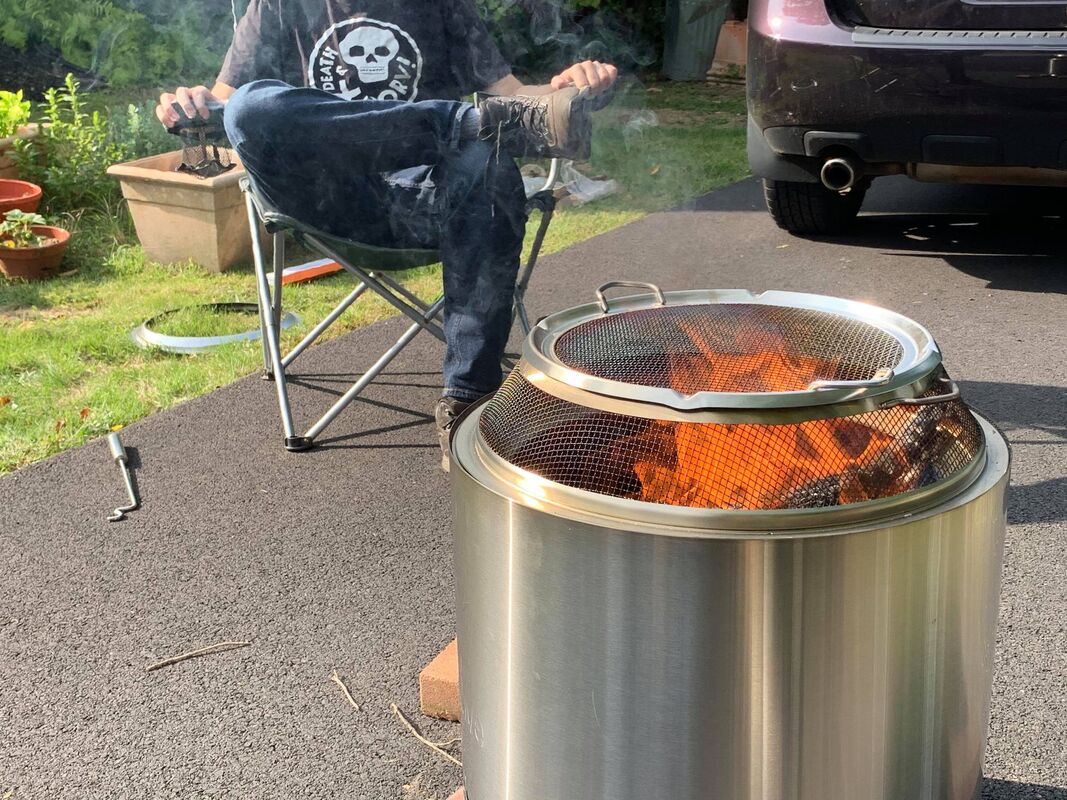
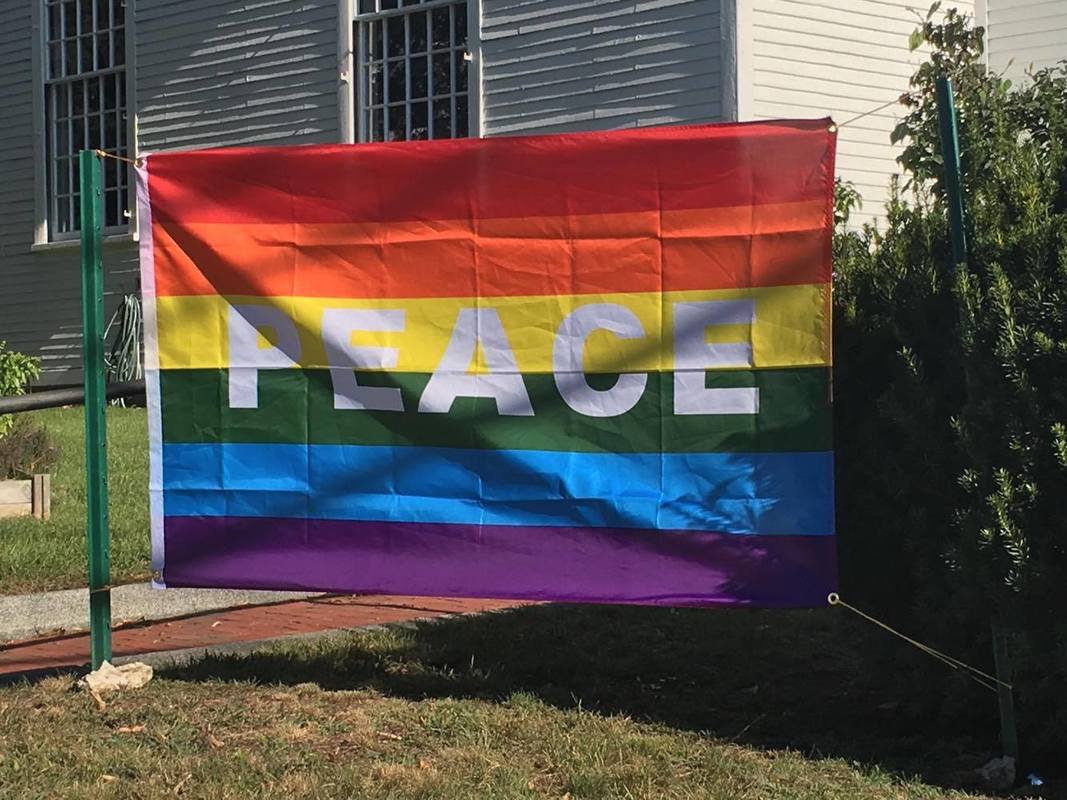
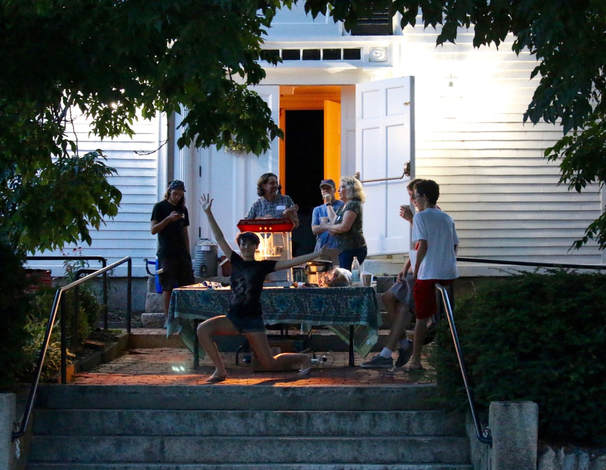
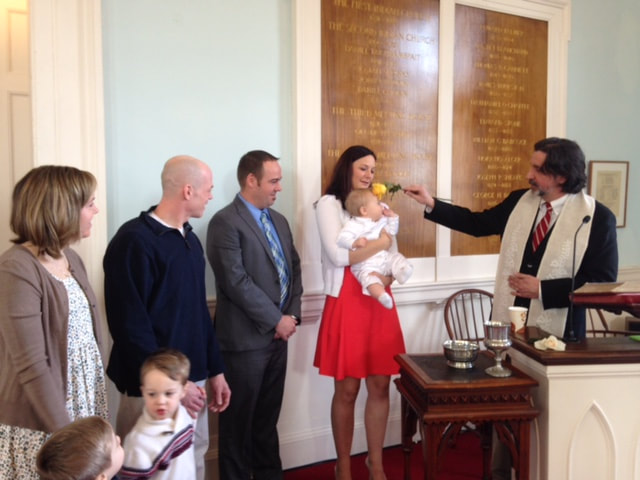
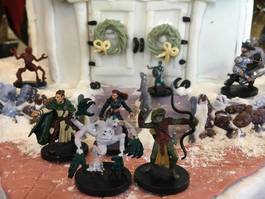
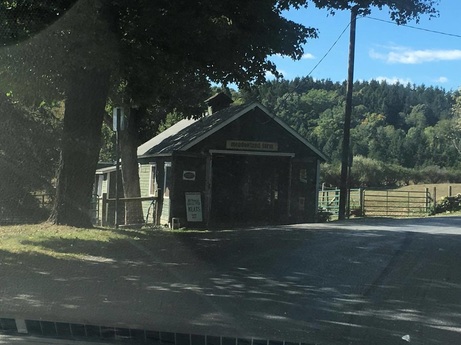
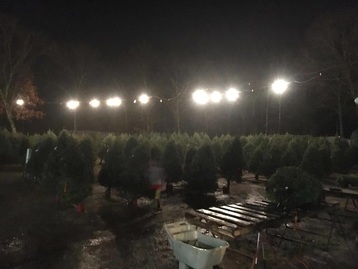
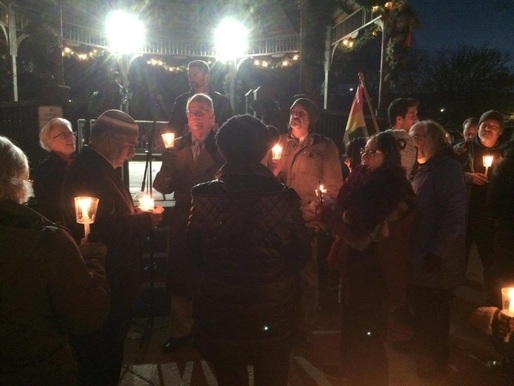
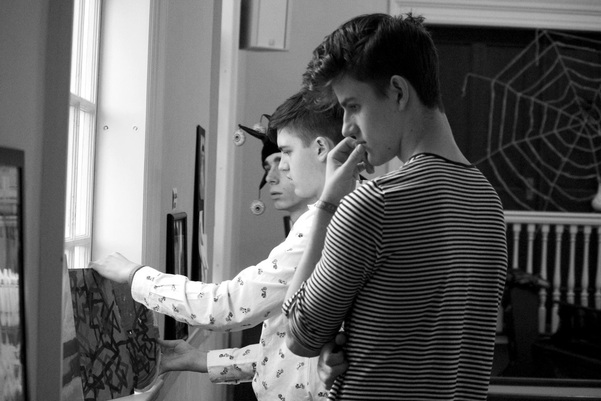
 RSS Feed
RSS Feed